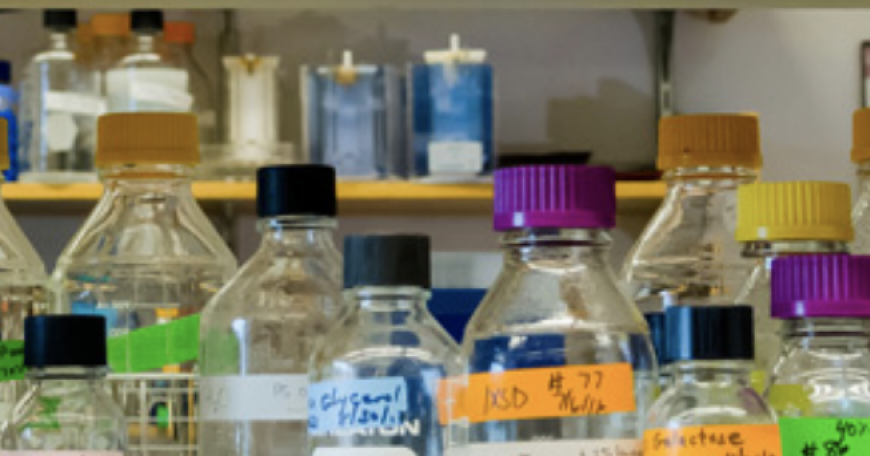Digital Innovations in Biology Curriculum

Extensive OCW participation has facilitated the Biology department’s early transition towards experimenting with MITx on campus and with MOOCs on edX. Starting with the first Biology subject published on OpenCourseWare in 2004, Biology’s presence on MIT OCW has grown to 44 subjects as well as 60 additional Advanced Undergraduate Seminars.
One of the first departments to explore using MITx, Biology offered its first MITx on edX MOOC in 2013. A multi-talented team of instructors, graduate students, post-docs, videographers, and edX staff created and built Eric Lander’s 7.00x Introduction to Biology course. Currently, Biology uses MITx for 10 residential subjects per year for MIT students as well as 5 MOOCS on edX, which are made available globally for free with fee-based certificates.
Digital Learning Scientist Dr. Mary Ellen Wiltrout and current Digital Learning Fellows Dr. Swati Carr and Dr. Darcy Gordon (Dr. Sera Thornton and Dr. Nathaniel Shafheimer in prior years) serve a critical role for Biology (Course 7), not only as domain experts in the field of biology but also as sophisticated digital practitioners of instructional technology and learning platforms. Being able to provide a bridge between the academic discipline and cutting-edge digital tools has enabled Wiltrout and her team to integrate digital innovations into Biology’s curriculum in effective and efficient ways.
Departmental Innovation Strategy
The Biology’s Departmental Innovation Strategy pursues the following goals:
- Focus on core subjects that will benefit the most students and faculty in the department.
- Share specific projects with broader appeal to the world.
- Showcase MOOCs that highlight the unique qualities of MIT’s Biology curriculum such as its molecular focus and application of scientific thinking in teaching and learning rather than a factual approach.
Faculty Highlights
Currently, Biology takes advantage of the MITx platform on campus to implement several evidence-based teaching practices:
Retrieval practice boosts long-term memory gains. 1. Required low-stakes computer-graded testing in 7.06 Cell Biology and 7.28/7.58 Molecular Biology is encouraging students to conceptualize lecture content through retrieval practice.
As supported by the summary by Freeman et al., 2. active learning techniques, such as peer-to-peer learning and in-class questions that Professor Steve Bell applies in 7.28/7.58 Molecular Biology, increase learning and raise student grades.
Other innovative digital initiatives in Biology include:
- In 2014, Wiltrout and her team converted an in-person, invitation-only Quantitative Biology Workshop into a digital course expanding the impact of the outreach project internally and externally. The Quantitative Biology Workshop is an essential tutorial for incoming graduate students who lack preparation in quantitative methods. UROPs, residential students, and post-docs as well as any learner outside of MIT needing more experience for quantitation in the lab also study via this self-guided MOOC.
- The online Advanced Standing Exam (ASE) for the Introduction to Biology General Institute Requirement (GIR) duplicates the academic rigor of previous ASEs and enables digital mechanisms to prevent cheating. Data available from online ASE tests inform student learning and future pedagogical choices.3.
- Through Wiltrout’s work, 7.05 Biochemistry uses the residential MITx platform to give students the opportunity to view and manipulate protein structures in 3D with PyMOL. 80% of students in 7.05 felt the PyMOL visualizations helped them better understand the structures of nucleic acids and proteins.
- 7.012, 7.013, 7.014 and 7.016 Introduction to Biology also use MITx course sites for supplemental resources.
- Wiltrout and her team modularized the 7.28/7.58 Molecular Biology course at MIT into the 3-part MOOC 7.28x Molecular Biology series that allows learners to experience molecular biology through animations and assessments that lead them through the scientific thought process of lab experiments.
Impact
In 7.06 Cell Biology, animated videos illustrate biological processes which help students understand concepts from experimental lab work. Students polled in 7.06 “unanimously posited that they understood the concepts better with videos (100%) than they would have had they needed to read the original literature papers…. almost all (95%) of the 7.06 students would like to see more experimental videos for other biology courses and think that future 7.06 students will find the videos useful”. Anecdotal comments such as, “I’m a visual learner, so seeing things… rather than words was very useful to me” and “the videos… really clarify the experiments” 4., suggest that students gain insight and understanding from videos that would not be available in two-dimensional formats.
7.06 Professor Adam Martin noticed an “improvement in students’ ability and willingness to suggest experiments that address a cell biological problem in lecture. They were thinking like cell biologists”. 5.
Future
When looking toward the future, Biology is focused on digital innovations that further enhance the teaching and learning experience on campus. The goal is to first make these features available to residential students, then when appropriate, share them with the world.
What You Can Do
Open Learning Residential Learning Engineers are available to advise on pedagogical approaches and strategies. Request a consultation on leveraging technology to improve teaching and learning for MIT students: odl-residential@mit.edu.
Request a course site on Residential MITx: odl.mit.edu/mit-faculty/use-digital-learning/self-author-residential-mitx.
Open Learning Educational Technologists provide frontline support for a quick orientation to the MITx platform. Schedule an orientation session with MITx Educational Technologists: mitx-support@mit.edu.
[1] Roediger, H.L., et al. “The critical role of retrieval practice in long-term retention.” Trends in Cognitive Sciences, 15(1), 20-27 (2011). http://doi.org/10.1016/j.tics.2010.09.003
[2] Freeman, Scott, et al. "Active learning increases student performance in science, engineering, and mathematics." Proceedings of the National Academy of Sciences 111.23 (2014): 8410-8415.
[3] Wiltrout, M.E, internal white paper “Spring 2017 Digital Learning in Biology Highlights”
[4] Thornton, S. and Wiltrout, M. E. (2015, Dec. 2) Teaching MIT Students to think like Cell Biologists: A Visual Approach. EducationXpress Retrieved from http://www.educationxpress.org/journal/teaching-mit-students-to-think-cell-biologists-visual-approach-0.
[5] ibid.

